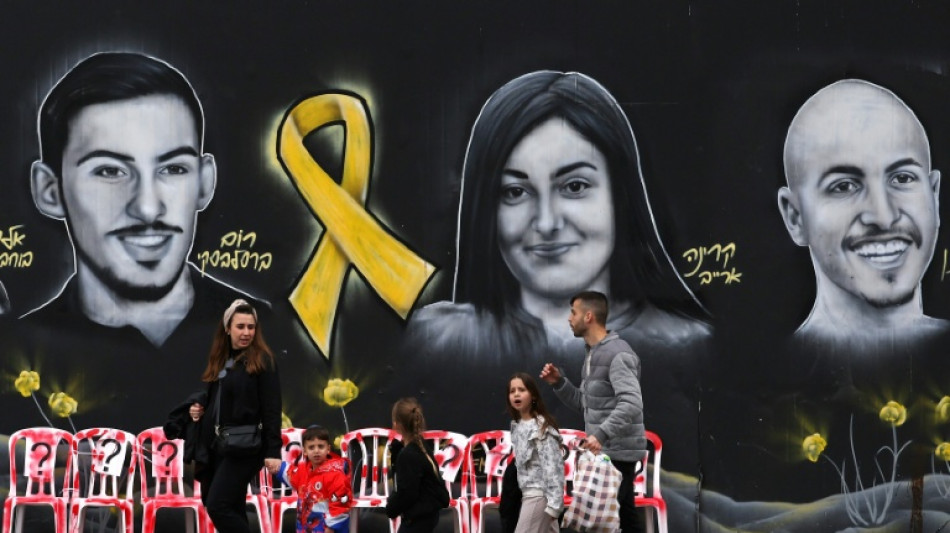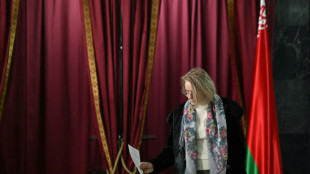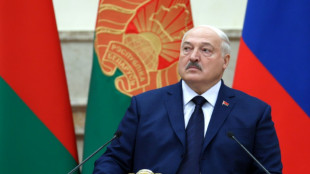

Hamas says to give names of hostages on Friday for next swap with Israel
A senior Hamas official told AFP that his group will provide on Friday the names of four Israeli women hostages to be freed the following day in the second exchange of a ceasefire agreement.
If all goes according to plan, once Hamas releases the four hostages on Saturday, Israel should free a group of Palestinian prisoners, though neither side has specified how many they will be.
The exchange is part of a ceasefire agreement between Israel and Hamas in the Gaza war, which took effect on Sunday and saw three women hostages and 90 Palestinian prisoners freed.
The fragile agreement is intended to pave the way to a permanent end to the war in Gaza, which began with Hamas's October 7 attack on Israel.
"Today, Hamas will provide the names of four hostages as part of the second prisoner exchange," said Bassem Naim, a member of Hamas's political bureau based in Qatar.
"Tomorrow, Saturday, the four women hostages will be released in exchange for a group of Palestinian prisoners, as agreed upon in the ceasefire deal."
Naim also said that Palestinians displaced by the war to southern Gaza should be able to begin returning to the north of the devastated territory.
"An Egyptian-Qatari committee will oversee the implementation of this part of the agreement on the ground," he said.
"The displaced will return from the south to the north via Al-Rashid Road, as Israeli forces are expected to withdraw from there in accordance with the agreement."
- 'Eating away at us' -
The ceasefire agreement, brokered by Qatar, Egypt and the United States after months of fruitless negotiations, should be implemented in three phases.
US President Donald Trump, who has claimed credit for the agreement, said Thursday he believed that "the deal should hold".
"I mean, the deal should hold, but if it doesn't hold there'll be a lot of problems," he told reporters.
During the first, 42-day phase, 33 hostages Israel believes are still alive should to be returned in exchange for around 1,900 Palestinian prisoners held in Israeli jails.
The first swap, which took place on Sunday, saw the release of Israeli hostages Emily Damari, Romi Gonen and Doron Steinbrecher.
They were handed over to the Red Cross in Gaza City by Hamas fighters surrounded by a large and chaotic crowd.
In the early hours of Monday, 90 Palestinian prisoners were freed from Israeli jails, most of them women and minors.
Among them were prominent figures such as Khalida Jarrar, an activist of the Popular Front for the Liberation of Palestine (PFLP).
In Israel, families of hostages held for more than 15 months in Gaza fear that the ceasefire could collapse.
"The worry and fear that the deal will not be implemented to the end is eating away at all of us," said Vicky Cohen, the mother of hostage Nimrod Cohen.
"Even these days, there are elements in the government who are doing everything in their power to torpedo the second phase."
Some far-right members of Prime Minister Benjamin Netanyahu's governing coalition opposed the deal, with firebrand Itamar Ben Gvir pulling his party out of the coalition in protest.
- Lebanon withdrawal delay -
During their 2023 attack on Israel, Hamas militants took 251 hostages, 91 of whom remain in Gaza, including 34 the Israeli military has confirmed are dead.
The attack, the deadliest in Israel's history, resulted in the deaths of 1,210 people, mostly civilians, according to an AFP tally based on official Israeli figures.
Israel's retaliatory response has killed at least 47,283 people in Gaza, a majority civilians, according to the Hamas-run territory's health ministry, figures which the UN considers reliable.
The war sparked a major regional crisis, with Israel's northern neighbour Lebanon dragged into the conflict for more than a year.
Just a day after the Hamas attack, its Lebanese ally Hezbollah began low-intensity strikes on Israel, sparking a near-daily exchange of fire between the two sides.
The hostilities then escalated into a full-scale war that a November 27 ceasefire brought to a halt.
Under that agreement, Israeli forces were to withdraw from southern Lebanon by January 26, while the Lebanese army and UN peacekeepers deployed in the area.
Hezbollah, meanwhile, was to withdraw north of the Litani river in south Lebanon and dismantle its military assets in the area.
But Israel on Friday said its withdrawal would continue beyond Sunday.
"Since the ceasefire agreement has not yet been fully enforced by the Lebanese state, the gradual withdrawal process will continue in full coordination with the United States," Netanyahu's office said in a statement.
G.Muller--LiLuX



